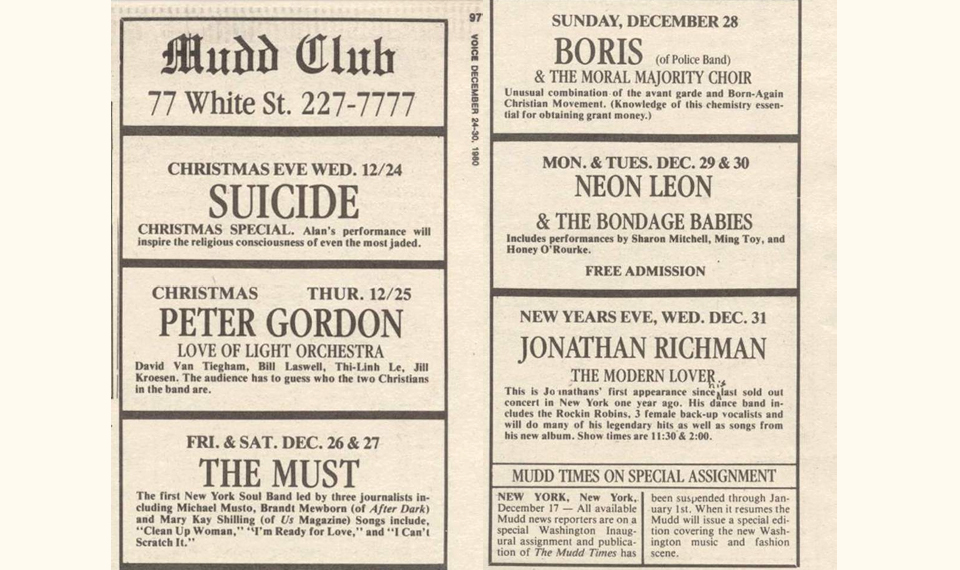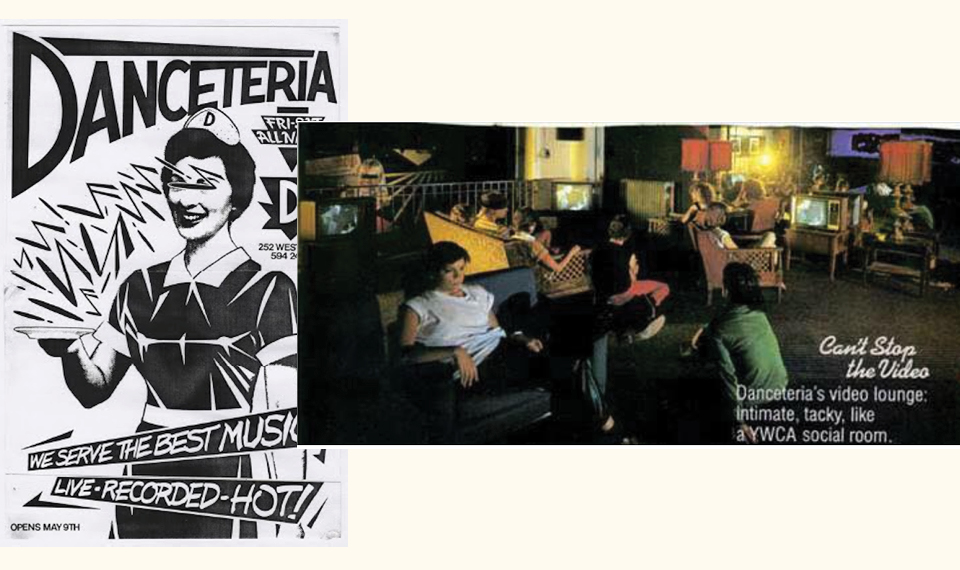Let’s Eat! Let's Dance! Let's Eat Again! Late Night Living in Three Parts
For his New York Stories column, author and former Mudd Club doorman Richard Boch revisits the iconic gathering spots of the late 70s and early 80s.
The new year, 1979, is only a few weeks old. We’ve just finished dinner at One University Place, the downtown watering hole that’s been attracting the hipster, cognoscenti, desperado crowd since it opened in September 1978. The evening is closing in on 2am, the witching hour or whatever you’d like to call it is upon us, but no one seems in any hurry. It’s still early.
Studio 54 1978 and 1979: Uptown Slumming
Mickey Ruskin, One U’s visionary saloonkeeper and the man behind the Ninth Circle, Max’s Kansas City, Lower Manhattan Ocean Club and now Chinese Chance/One University is in and out of the office with a variety of diners and barflies in tow. From my vantage point, they all emerge happier, more animated and ready for another drink. My friends and I on the other hand are ready to split. The dancefloor of Studio 54 is calling or maybe we’re just eager to do some uptown slumming. Either way, there’s a big roomy Checker cab waiting outside.

When Studio 54 opened back in Spring 1977, it was a game changer. Downtown was very much in the throes of CBGB, Max’s and all that was Punk with no sign of letting up. Uptown was a far-away world and there was no reason to make the trip unless you had the misfortune of living there. That was before Studio, with its balconies, basement and bathrooms—not to mention the pounding beat of the music—became the ultimate dance hall, coke bar, Quaalude dispensary and louche sex palace. But hey, we’re all fickle creatures, especially where nightlife is concerned, and by Fall ’78 the novelty, and in a sense the glamor of hanging out on W 54th Street, began to wear thin. The mega-disco-glitz-extravaganza was becoming one-note—people were getting bored and looking to get down and dirty again. No one was quite ready to give up on 54 but we were ready to change up the routine and by late 1978 we were telling cab drivers, “Broadway and White Street, two blocks below Canal.”

Mudd Club 1979 and 1980: Proof of Age and a 4 AM Closing Meant Nothing
The Mudd Club, located at 77 White Street, officially opened on Halloween 1978 with the fledgling B-52’s singing about a “Rock Lobster” as the opening night entertainment. It went off fairly well given the chaos at the door, an over-crowded dance floor and a few equipment glitches. Regardless, the Mudd Club immediately became the new place to drink, dance, socialize and meet one’s latest partner in crime. Mudd was smart and less mindless than Studio; it was a shape-shifting hole in the wall, in what was still the slightly rundown, artistically inclined neighborhood that we came to call Tribeca. White Street became a destination and by the time I started working the Mudd Club door in March 1979, people were begging and sometimes telling me, “…but Studio 54 lets us in.”

Original Danceteria: 37th St. May 1980 – Oct 1980
The year flew by, the decade moved on and by May 1980 the real headliner for the 2am drink, dance and party crowd was the not-often mentioned, original and first iteration of Danceteria on W 37th Street. Not to be confused with the legendary W 21st Street club, the original, located on a deserted block of the daytime-focused Garment District kept going until mid to late morning. Operating as a hybrid of late night and after-hours, it was a place to see some of the greatest bands of the day including The Go-Go’s, X, Lounge Lizards, and Suicide. It was great fun but totally illegal—blocked fire exits, no permits for anything like music or dancing and operating without a liquor license, but serving liquor. Despite the problems, the place was a perfect spot to gear up for a lost after-hours morning or even a long lost weekend.


AREA 1983 -1987: Artists, Socialites and Celebrities
September 1983 and AREA, the brainchild of Eric Goode and Serge Becker, stood at the ready, instantly becoming the latest hotspot-nightspot on the NYC Nightlife scene. Socialites and A-list celebs mingled, danced and caroused with the worlds of art and fashion—same as it ever was except for bigger hair and bigger shoulder pads. Confinement aka bondage and Suburbia along with a bit of taxidermy, art, culture and sci-fi were just a few of the ever-changing themes that kept AREA in play for a crowd that was always ready to move on to the next big thing. For me, the place was special, with great DJs, busy bathrooms and a neighborhood location just opposite the Holland Tunnel traffic circle. Eric Goode was always kind to me and quite generous, possibly due to my colorful past and our early Mudd Club connection. I could walk to AREA and walk home unless too much nightlife might impede my ability to walk or hamper my sense of direction.



Pyramid: 1980s East Village and Nightlife for Everyone
Pyramid Club on Avenue A was located opposite Tomkins Square Park in what was then a very edgy and somewhat dodgy East Village. Opened as an old man’s bar sometime in late 1979, you could throw back a few drinks to get straight at 8 or 9am before heading off to work. Then, when the ’80s rolled in along with the go-go boys, drag queens and a spirited atmosphere of lovable misbehavior it became something else. By the time it closed several decades later, it had played host to everyone from Andy Warhol, Ethyl Eichelberger, Debbie Harry and even a live performance by an up-and-coming Seattle band called Nirvana. The Pyramid had something for everyone and like so many other beloved places, it was of the time and for the time.

Today the Mudd Club is long gone yet the memories and legacy remain to this day. Studio 54 became just a shell of its former self, constantly changing faces in a struggle to survive. The original Danceteria lasted a mere five months before it was raided by the feds—but, for the most part, those five months were terrific. AREA made a graceful exit sometime in 1987, and Pyramid managed to hang on, in various incarnations, into the new millennium.
Keep in mind the drinking age in New York was 18 until 1985. There was no such thing as asking for proof of age, there were no wristbands needed to drink and guest lists were for amateurs. NYC was still wild and largely ungentrified. Closing a bar at 4am was loosely defined, often just locking the doors and keep on serving. By 5am it was either time for breakfast or time for an after-hours club crawl fueled by more beer, more cocaine and mindless sex. That was the late ’70s/early ’80s NYC nightlife—and it was a beautiful thing.
***
Coming Soon
Part III: Let’s Eat Again and Dance Some More
WORDS Richard Boch
FEATURED PHOTOGRAPH Debbie Harry, Studio 54 owner Steve Rubell (laying down), Lorna Luft (daughter of Judy Garland, far right) and others at Studio 54
Richard Boch writes GrandLife’s New York Stories column and is the author of The Mudd Club, a memoir recounting his time as doorman at the legendary New York nightspot, which doubled as a clubhouse for the likes of Jean-Michel Basquiat, Keith Haring, Debbie Harry and Talking Heads among others. To hear about Richard’s favorite New York spots for art, books, drinks, and more, read his Locals interview—here.








